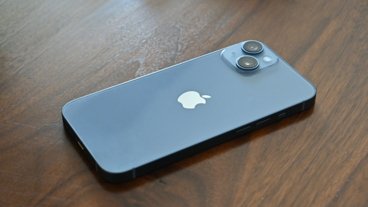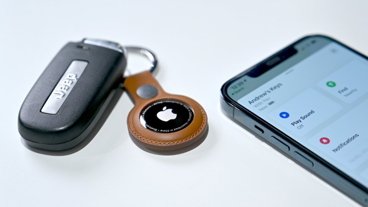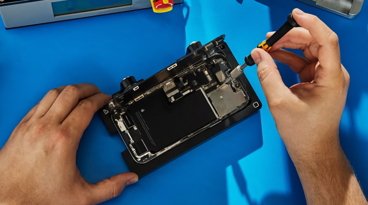Samsung's efforts to lift injunction on Galaxy Tab in limbo as Apple targets its better selling smartphones
Heading into its trial with Samsung, Apple was only able to secure a preliminary injunction against Samsung's tablet. Following the jury's verdict, Apple is now targeting Samsung's best selling infringements in a strategy to disrupt the company's U.S. sales momentum, just in time for the important holiday season.
Samsung has filed to lift the pre-trial injunction on the Galaxy Tab, noting that the jury found no infringement against Apple's D'889 iPad design patent. Because no infringement was found in the case of the Galaxy Tab 10.1 model, Samsung is also seeking lost sale damages out of the $2.6 million bond Apple posted related to the injunction request.
However, according to Florian Mueller of FOSS Patents, Apple is likely to "bring a Rule 50 motion asking the court to overrule the jury with respect to the infringement of the D'889 patent."
Leading up to the preliminary injunction of the Galaxy Tab, Judge Lucy Koh initially denied Apple's request to block sales of the Samsung tablet last December due to doubts concerning the validity of Apple's design patent.
However, those issues were resolved by Federal Court reversal of Koh's decision, allowing the injunction to be granted in June. While the jury found no infringement of the D'889 patent, Samsung still has to argue its case for clearing the injunction; the jury's verdict does not automatically end the sales ban.
Mueller noted that, "at this point I don't think it really matters too much to Apple whether or not the Galaxy Tab 10.1 remains on sale. There's little demand for it, and Samsung has newer products on the market that are more relevant. But Apple has to fight for this for two reasons."
The first being that it might encourage Samsung to launch new iPad-like tablets, and the second being that, simply, "it wouldn't look too good if Apple had to pay for damages based on overly aggressive enforcement."
Apple is not just challenging Samsung's efforts to overturn the Galaxy Tab 10.1 injunction, but according to a report by Bloomberg, is asking the court to extend the ban to cover the cellular version, which wasn't listed in the trial.
Apple's filing noted, "While the cellular version of the Galaxy Tab 10.1 was not included in the verdict form, it is not colorably different from the products that the jury found to be infringing as to some Apple utility patents, and thus should be covered by an injunction against sales of products that infringe those patents," a statement that essentially says the jury was mistaken in not finding infringement.
According to Samsung's own figures (above), it has sold fewer than 750,000 Galaxy Tab 10.1 units (in both cellular and WiFi-only versions) in the US over the course of 2011 and 2012, in contrast to the 26 million U.S. iPads Apple sold over the same period.
While that makes the device commercially irrelevant to Apple's own iPad sales, any efforts by Samsung to pursue intensified copying efforts emboldened by the jury's verdict of non-infringement could eventually cause problems for the iPad designer, making it in Apple's interests to argue that the jury's verdict was essentially irrelevant because courts have already found likely infringement.
Apple targets Samsung's bigger fish in smartphones
While continuing to argue against lifting the sales ban on the poor selling Galaxy Tab 10.1 on grounds of principle, Apple has targeted just 8 of the 30 accused smartphones involved in the trial with requests for sales injunctions.
A review of Samsung's reported sales from the trial (below) explains why the company is focusing on these specific models: they're the company's most lucrative of Samsung's accused models.
While the Captivate, Fascinate and Vibrant were given attention during the trial, Samsung either doesn't even sell them anymore, or their sales have dropped off toward irrelevance in the fast moving market of smartphone models. The eight models Apple is seeking injunctions on are Samsung's top selling accused U.S. models.
Apple's injunction strategy targets Samsung's volume sellers, which will force the company to rebuild its product portfolio right as the holiday shopping season begins. Samsung sells an unreported number of higher end models on par with Apple's iPhone 4S (which were not involved in this case) but sales of these premium models are supported by sales of more pedestrian models marketed by US carriers as inexpensive choices.
Underlying that is the fact that six of Samsung's currently selling U.S. models that Apple is seeking to ban still ship with Android 2.3 Gingerbread (from the end of 2010), while the Galaxy S Showcase and Droid Charge are sold running Android 2.2 Froyo, which debuted prior to the release of Apple's iOS 4.0 more than two years ago.
Apple has previously targeted modern phones, winning an injunction on the Galaxy Nexus in June, which runs a modern version of Android. However, it is also not a top seller for Samsung.
Apple also sought to win a preliminary injunction against the new Galaxy S III in July, asserting additional patents.
That injunction was not granted (nor was the model included in the most recent trial) because Judge Koh said she couldn't fit the issue on her calendar on such short notice. Following the jury's verdict, Apple is likely to target that model again and press for damages accrued since it went on sale in June.
 Daniel Eran Dilger
Daniel Eran Dilger
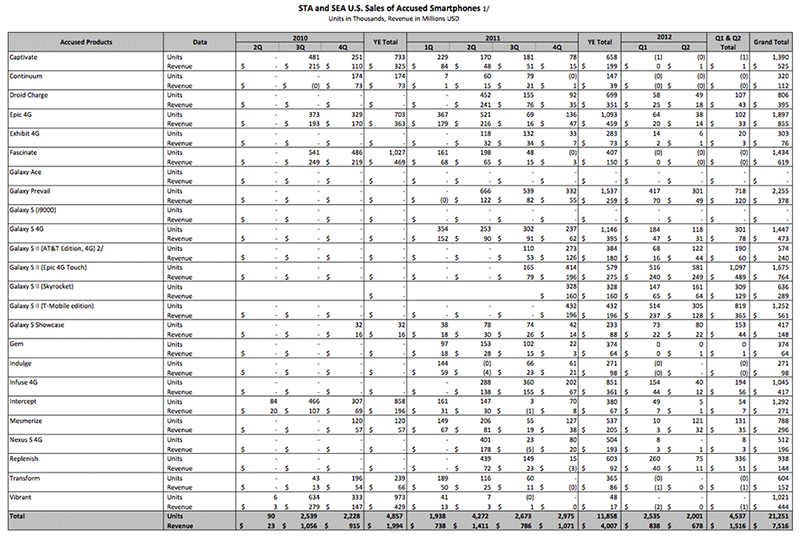
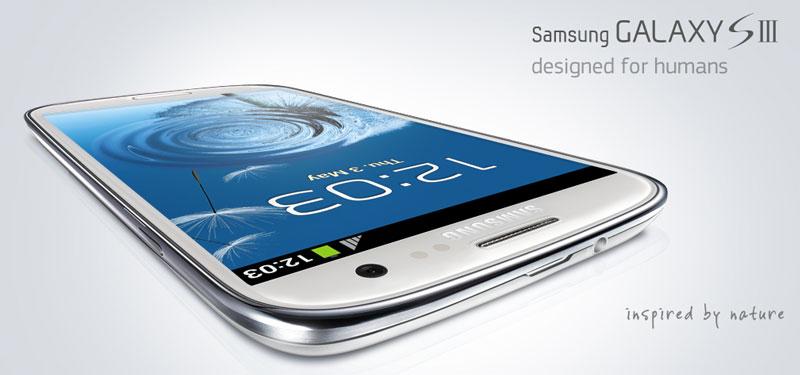











 Andrew Orr
Andrew Orr
 Sponsored Content
Sponsored Content
 Malcolm Owen
Malcolm Owen

 William Gallagher
William Gallagher

 Mike Wuerthele
Mike Wuerthele
 Christine McKee
Christine McKee